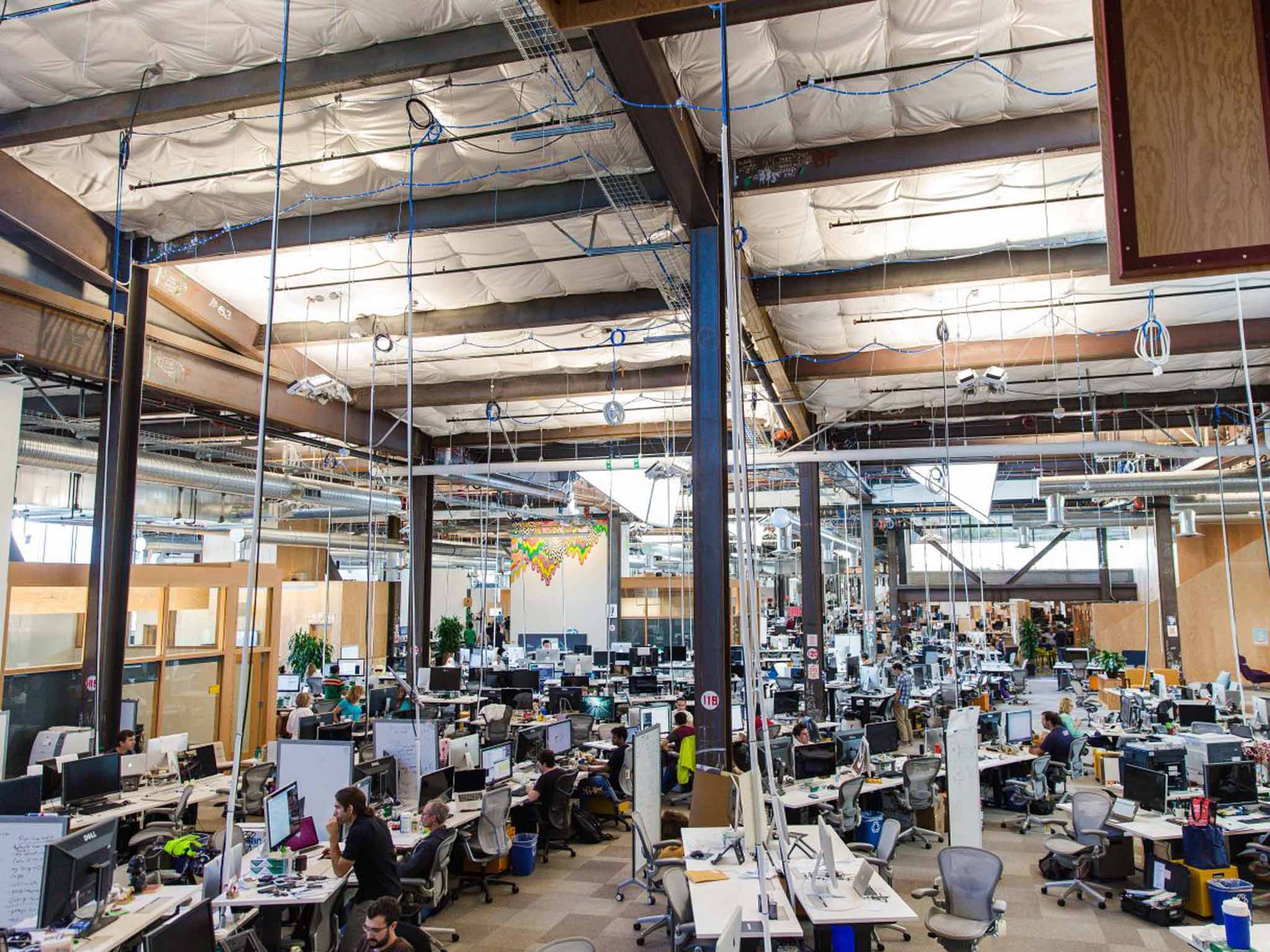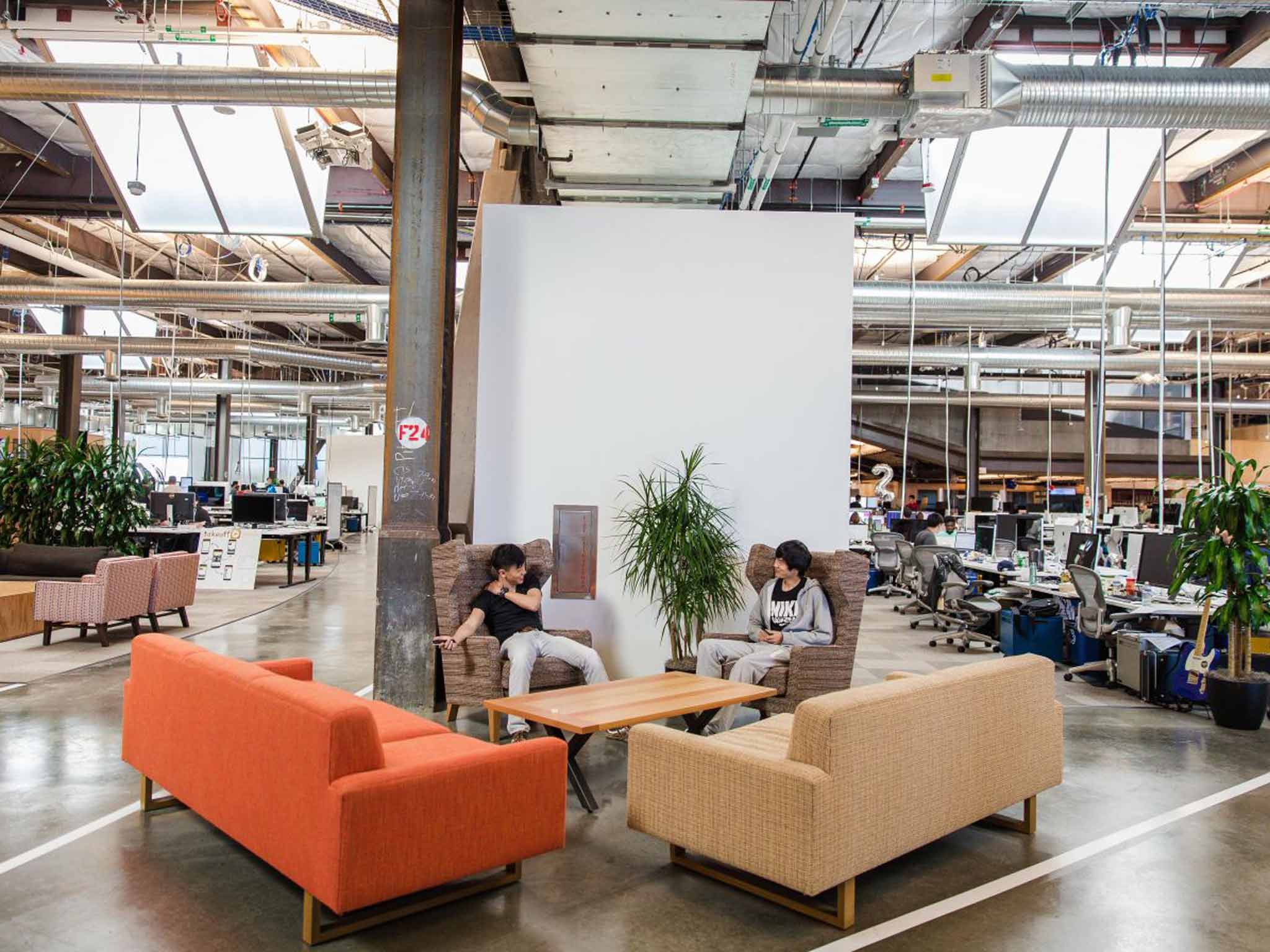Facebook's new headquarters where open-plan is king and 'frictionless working' is the aim
It's modern, enormous, and privacy's not included

Your support helps us to tell the story
From reproductive rights to climate change to Big Tech, The Independent is on the ground when the story is developing. Whether it's investigating the financials of Elon Musk's pro-Trump PAC or producing our latest documentary, 'The A Word', which shines a light on the American women fighting for reproductive rights, we know how important it is to parse out the facts from the messaging.
At such a critical moment in US history, we need reporters on the ground. Your donation allows us to keep sending journalists to speak to both sides of the story.
The Independent is trusted by Americans across the entire political spectrum. And unlike many other quality news outlets, we choose not to lock Americans out of our reporting and analysis with paywalls. We believe quality journalism should be available to everyone, paid for by those who can afford it.
Your support makes all the difference.
Deep inside Facebook's massive new headquarters in Menlo Park, California, the largest open-office workspace in the world, sits the desk of Lindsay Russell.
The desk is a white slab, 5ft long, no drawers. The top has room for her laptop, computer monitor and a few knick-knacks. Russell, a brand strategist, also has an office chair and small filing cabinet. That's it. No coat rack. No office phone. Her just-delivered dry cleaning, handled by Facebook, hangs by its metal hangers from the desk's lip. There are no cubicle walls. No partitions. Her desk sits cheek-by-jowl in a pod with five other desks, a scene repeated across the cavernous Frank Gehry-designed space filled with 2,800 employees.
Even the chief executive, Mark Zuckerberg, sits out in the open at one of those simple white desks. An office is not one of perks to being the billionaire founder of one of Silicon Valley's most important companies.
Need privacy? Small meeting rooms are scattered all over. Or slip on headphones. “That's the hack for not having office doors,” Russell, 31, says.

Walking into Facebook's new headquarters can feel like entering the office of the future – open, fluid and informal. It's a place where change seems like a given, and the management structure implied by corner offices is a relic. The building stands out as an extreme example of how tech firms intend to change the nature of work through more than software alone. And it goes beyond ballyhooed perks such as massages, ping-pong and three meals a day. “They're trying to make work as frictionless as possible,” Gregg Stefancik, 48, an engineering director, says.
Still, this future of work will not be welcomed by everyone. Open offices are contentious, despite millions working in them (nearly 70 per cent of US workers now reporting for duty in one). Although the trend has been growing for more than a decade, according to the International Facilities Management Association, studies have reported that some people find them noisy and distracting, even a drain on morale. And this is true despite most open offices still featuring low-wall cubicles.
What Facebook implemented goes a step further and, for now, remains rare: no walls inside an entire building engineered to facilitate a new way of doing work. Other major Silicon Valley firms such as Apple and Google are planning futuristic workplaces, too.
Facebook's headquarters opened earlier this year. It is known as Building 20. The 430,000 sq ft structure sits on a 22-acre site just across a highway from Facebook's existing campus, which originally had been built for Sun Microsystems. Building 20 was the first that Facebook built from scratch.
Natural light pours in through skylights and massive windows as if to point out the passing of time. Building 20's unfinished look – exposed steel girders, concrete floors and wires dangling from the soaring ceiling to desks below – recalls a fledgling start-up instead of the world's largest social network, with 1.5 billion monthly active users worldwide. “It's intended to be a symbol of what we believe at Facebook, which is that our work is unfinished,” Lori Goler, vice-president of people, says.
The lack of offices for Zuckerberg and the rest of his management team is seen by many Facebook employees as proof of the company's openness. They don't even occupy the best office property, such as near the soaring windows with stunning views of nearby salt marshes. But navigating a single room that stretches 1,500ft in length and includes thousands of co-workers can be a challenge. So Facebook installed Wayfinders, touch screens running in-house software that allows you to find any desk.
And the dozens of small meeting rooms are organised into whimsically named neighbourhoods, such as music festivals or media mash-ups. So a worker knows that the room called “13 Going on 30 Rock” is near “Clockwork Orange is the new Black”. “It's a really great organisational aid,” Stefancik, the engineering director, says. “I depend on it.”
Stefancik worked in traditional offices before coming to Facebook. Once he even had an office with a door – something that today sounds like the retirement gold watch or the three-martini lunch. But he says he prefers the open layout. He can overhear conversations and make unexpected connections with co-workers.
“Before, people would close their door and you'd feel this real barrier to talking to them,” Stefancik says.
The desks lack dividers, so there's nowhere to put up snapshots or family photo calendars. But photos are for posting to Facebook or Instagram, of course. Calendars are synched online, with reminders sent to mobiles. There's no need for a drawer to stash afternoon snacks or drinks because treats are provided for free.
“No one has a swanky office setup,” Russell says.
Russell recently walked through the office, past rows of desks and walls plastered with posters and handwritten messages meant to evoke an urban scene.
“It feels organic and intentional at the same time,” she said.
She stops to point out where Zuckerberg and Facebook's chief operating officer Sheryl Sandberg sits. Zuckerberg is out. But Sandberg is holding a meeting in a glass-walled room near her simple desk. The meeting room is one of the few office perks for being a corporate leader.
But Russell or any of the other 2,800 workers can watch it all.
“I've never seen the blinds drawn,” she says.
© Washington Post
Join our commenting forum
Join thought-provoking conversations, follow other Independent readers and see their replies
0Comments